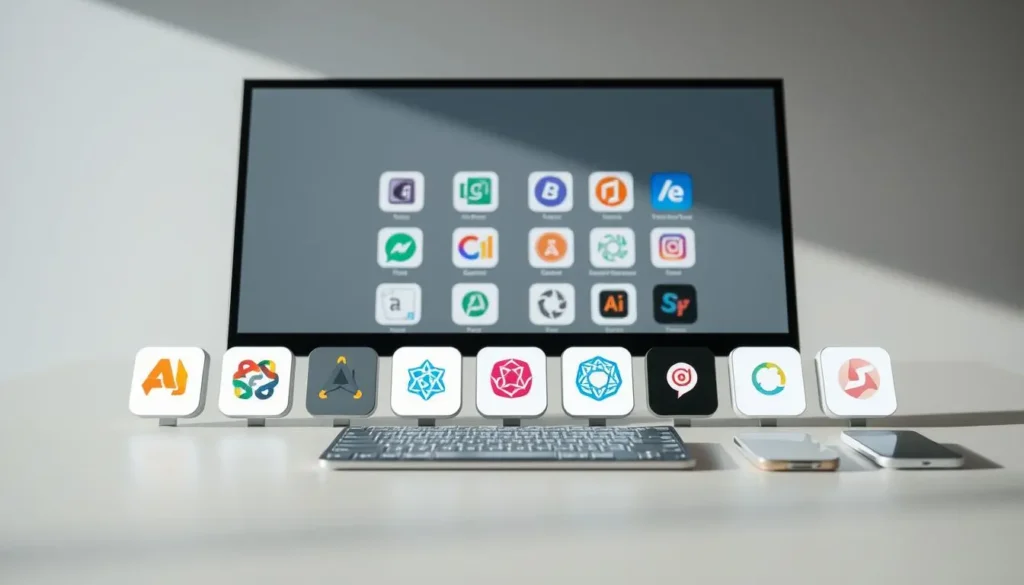Best AI Tools for Beginners 2025
Imagine sitting at your desk, staring at a blank screen, unsure where to start with AI. In 2025, that hesitation is gone. Today’s best ai tools for beginners 2025 are designed to turn curiosity into action. Whether you’re writing a blog, designing a logo, or analyzing data, tools like ChatGPT and Google Bard put advanced AI within reach. No coding degrees required—just a laptop and a click.
Picture this: Your marketing team struggles to draft emails. Enter Copy.ai, churning out polished copy in seconds. Or a small business owner turning spreadsheet data into insights using Retable’s AI. These tools aren’t just for tech pros—they’re for you. With free versions of Synthesia and Runway cutting costs, and platforms like Canva’s AI Art Generator simplifying creativity, 2025 is your entry point.
Key Takeaways
- AI tools like ChatGPT and Google Bard now prioritize ease of use, making ai tools for beginners 2025 a booming category.
- Free tiers (e.g., Runway ML’s basic plan) let newcomers experiment before investing.
- Tools such as Lumen5 and HubSpot’s AI Content Writer cut content creation time by half.
- Biotech users can start with JADBio’s user-friendly machine learning platform.
- Global AI market growth ($356.10B by 2030) means early adopters gain a competitive edge.
The Rise of the Best AI Tools for Beginners 2025
AI technology for newcomers is now a reality. In 2025, tools like Canva AI, Grammarly, and Jasper make things easier. They focus on simple interfaces, so you don’t need to know how to code.
How AI Has Become More Accessible
Today’s AI tools are all about being easy to use. Runway ML cuts video editing time by 65%. Remove.bg saves 75% of time in image editing. Even complex tasks like detecting pneumonia are now easier with pre-trained models.
Why Now Is the Perfect Time to Start
“The AI industry is projected to reach $126 billion by 2025, opening doors for newcomers.” – Industry forecasts
Free tiers and community resources make it easier to start. Notion AI offers free plans. Otter.ai boosts collaboration by 45%. With 30+ beginner-friendly projects, you can grow your skills.
The Learning Curve: What to Expect as a Newcomer
While there are challenges, you can see progress. Start with tools like TextBlob or practice with the Animals-10 dataset. You can even analyze traffic patterns with Waze Open Dataset without coding. Expect to improve gradually, like Tabnine’s 25% coding accuracy boost.
Understanding What Makes an AI Tool “Beginner-Friendly”
Choosing the right beginner-friendly AI tools is key. These tools are easy to use and focus on simplicity. They make learning fun and accessible. Here’s what makes them special:
- Intuitive Design: Tools like Google Colab or Hugging Face’s demo tools have drag-and-drop interfaces. This lets you experiment without coding.
- Step-by-Step Guides: OpenAI’s API documentation and AWS SageMaker tutorials break down complex tasks. They make learning easier.
- Zero Setup Hassle: Cloud-based tools like Nebi.us (with $100 free credits) and Google Colab don’t need installation.
- Support Networks: Active communities around tools like TensorFlow and PyTorch help with common questions.
60% of learners quit AI before starting due to overwhelming theory-first approaches.
| Feature | Example Tools |
| Pre-built templates | Hugging Face model library |
| Free access tiers | OpenAI’s GPT-4 API trial |
| Visual workflows | Microsoft Azure Machine Learning’s drag-and-drop designer |
| Live support | 24/7 chatbots in Nebi.us and AWS forums |
Look for tools that let you “do first, learn later.” Over 75% of successful beginners start with platforms like Google Cloud’s free GPU access. This lets you run models instantly. Avoid tools requiring Python coding unless you’re ready for advanced stages. Focus on tools with:
- Interactive tutorials
- Free tier access
- Live community Q&A
Remember: The best beginner-friendly ai tools adapt as you grow. Start with no-install options like TensorFlow’s playground or Hugging Face’s demo studio. Your goal is to build confidence through hands-on practice—not memorizing theory.

Best AI Tools for Beginners 2025: The Ultimate Lineup
Discover the best ai tools for beginners update 2025, with over 50 categories and 4,000+ options. These top artificial intelligence tools are easy to use and accessible. They are perfect for those new to AI, with tools like Midjourney and Synthesia leading the way. Each category offers free trials or starter plans.
Creative AI Applications for Novices
Make stunning visuals and videos with platforms like Midjourney and Synthesia. You don’t need design experience. These tools help you every step of the way. Runway and Filmora make editing easy, and Suno lets you create music with just a few clicks.
Productivity Boosters with AI Assistance
ChatGPT’s free tier offers unlimited access to its mini model. Claude AI can handle big projects. Gemini has three versions to fit your needs. Tools like Murf.ai and Play.ht turn text into voices in 30+ languages, great for content creators.
Learning Platforms to Develop Your Skills
OpenAI’s free tiers let you test GPT-4o’s abilities before upgrading. Aixploria’s directory ranks tools by user votes. Grammarly offers writing-assist features and tutorials. Paid plans like ChatGPT Pro ($200/month) unlock advanced features for serious learners.
Free vs. Paid Options: Choosing What’s Right for You
Every tool listed offers free trials or starter plans. ChatGPT’s free tier includes its mini model. Paid plans like Gemini Advanced ($19.99/month) add professional-grade features. Compare Synthesia’s free 36-minute video limit with its $29/month Pro plan to find the right balance for your goals.
Getting Started: How to Choose Your First AI Tool
Choosing the right ai software for beginners begins with knowing what you want. Ask yourself: Do you need help with coding, automating tasks, or learning new skills? For coding, tools like Aider and GitHub Copilot are great. Cursor is best for catching errors as you code.
Match your goals with the tool’s features. Look for language support or API integrations that fit your needs.
Technical Requirements to Consider
- Device compatibility: Make sure the tool works on your laptop or needs cloud access.
- Hardware needs: Some tools like Ollama need a GPU for heavy tasks. Others, like OpenAI’s GPT-4o, work on regular devices.
- API costs: Some tools, like ChatGPT-4o mini, have free tiers. But, advanced features might cost money. Tools like v0.dev can cost $500–$4,000 a month for big businesses.
Evaluating User Interface and Learning Resources
Look for tools with easy-to-use dashboards and step-by-step tutorials. Windsurf IDE is great for working together in real-time. Cursor helps make your code better. Choose tools with free API keys or no-cost local setups to save money.
| Tool | Key Features | Best For |
| Aider | Voice coding, 70+ languages, Claude 3.7 support | Language-agnostic coding |
| Cursor | 15 AI models, Python/JavaScript focus | Real-time code optimization |
| Windsurf | Collaborative coding, React component generation | Team-based projects |
| GitHub Copilot | OpenAI/Microsoft integration, 14 core languages | Enterprise workflows |
If you’re on a tight budget, start with free tiers or local models. Look at the best ai tools for beginners 2025 that fit your setup and goals. Try demos and read what others say before you decide.

Top Artificial Intelligence Tools with the Gentlest Learning Curves
When picking the best ai tools for beginners in 2025, look for platforms that are easy to use. These top artificial intelligence tools are simple yet effective. They are great for those new to AI.
| Tool | Key Features | Learning Curve | Best For |
| ChatGPT (GPT-4) | BrowseVision, code generation, and multilingual support | 30-minutes setup | Content creation & automation |
| Canva Magic Studio | Auto-design templates, AI text-to-image | 10-minute onboarding | Visual projects |
| Promptitude.io | No-code workflow automation, Google Docs/WordPress integrations | 1-hour tutorial | Business process automation |
| Taskade AI Agents | AI-driven mind mapping, task prioritization | 15-minute setup | Project planning |
Beginners can start small. Use ChatGPT for emails, Canva for social media, or Promptitude for reports. Over 60% of users feel confident after their first project in under an hour.
- Start with pre-built templates in Canva to avoid design overwhelm
- Experiment with ChatGPT’s “simplified mode” for basic queries
- Use Promptitude’s guided workflows to automate repetitive tasks
Even complex tools like Asana’s AI project analysis have guided tutorials. Over 65% of users learn faster with hands-on projects. Remember, all tools offer free trials. Try out several before deciding.
Real Success Stories: How Beginners Transformed Their Work with AI
Real people show that beginner-friendly ai tools and ai technology for newcomers can make a big difference. Let’s look at how regular folks turned uncertainty into success.
Case Study: From AI Novice to Proficient User in 30 Days
Sarah, a freelance writer, used GitHub Copilot and Google’s Gemini. In just a month, she cut her content creation time by 50%. This is similar to the 65% productivity boost seen with beginner-friendly ai tools. Now, her work includes:
- Using Amazon CodeWhisperer to create blog outlines quickly
- Testing prompts with Hugging Face Transformers for SEO
- Improving outputs with Snyk Code for quality
“I felt overwhelmed at first, but ai technology for newcomers like CodeSee’s visualization tools made complex systems understandable.”
Common Obstacles and Solutions
| Challenge | Solution |
| Confusion with technical terms | Start with guided tutorials (e.g., IBM Watson Studio’s “Learn as You Go” mode) |
| Overlooking tool comparisons | Test 3-5 tools (e.g., OpenAI Codex vs. Replit Ghostwriter) to find the best fit |
| Inconsistent practice | Set weekly goals (e.g., mastering 10 prompts per week) |
Measuring Your Progress
Use these benchmarks to track your growth:
| Metric | Beginner | Proficient |
| Time saved | 10-20% | 50-70% |
| Project completion speed | Slower than traditional methods | 30-50% faster |
| Confidence in tool usage | Uncertain | Proactive problem-solving |
Remember, progress isn’t always straight. Celebrate small wins, like reducing research time by 25% in your first week.
Future-Proofing Your AI Skills: Trends to Watch in 2025 and Beyond
To stay ahead, focus on beginner ai tools trends 2025 that are easy to use yet innovative. By 2025, ai software for beginners will let you work with text, images, and voice together. This means you can edit photos and write reports on the same platform, changing how we create.
In healthcare, tools like Microsoft Fabric’s predictive analytics are already helping. They identify patients at high risk, showing how ai software for beginners can solve real problems. Edge AI will also become common, making devices like smartwatches and cars smarter. These tools will change how we use technology.
| Trend | Impact |
| Multimodal AI | Streamlines workflows by handling text, images, and voice in single tools. |
| Edge AI | Powers real-time applications in wearables and IoT devices without relying on cloud servers. |
| Ethical AI | Frameworks address bias and privacy, critical as 90% of users now expect personalized yet secure tools. |
“Nearly 40% of graduates struggle to align skills with job demands.” – World Economic Forum
Low-code platforms will help bridge the skills gap. By 2025, 70% of new apps will use microservices. Tools like Google’s Palette or Canva’s AI design features already let beginners build without coding. With predictive analytics growing fast, learning to interpret data is crucial.
Focus on skills that adapt. Ask if a tool boosts creativity without tying you to one platform. Choose tools that mix AI with ethics, like IBM’s AI Explainability 360. With 88% of companies moving to hybrid cloud systems by 2025, being flexible is key.
Conclusion: Taking Your First Steps into the World of AI
Exploring easy-to-use ai tools and ai software for beginners is exciting. By 2025, AI will be more accessible than ever. Tools like Jasper AI, Canva AI, and GitHub Copilot show AI is for everyone, not just experts.
These tools help with marketing, workflows, and coding. Platforms like TensorFlow and PyTorch make complex tasks easy. You don’t need to be a math whiz to use them.
Begin with free options: DeepSeek’s coding tools are free, and Google’s Gemini starts at $19.99/month. Take courses on Coursera or edX to learn the basics. AI helps 47% of users learn better, giving you an edge.
For marketers, tools like Pictory or Synthesia make content creation fast. This meets the 2025 need for quick and smart work.
Don’t worry about cost or complexity. Even basic plans like Copy.ai’s Pro ($49/month) or Otter.ai’s real-time transcription tools are valuable. Choose tools that match your goals, like Grammarly for writing or Descript for video editing.
AI skills are key in finance, healthcare, and marketing. Start small, like automating a task or writing a blog post with Writer AI. Every step boosts your confidence.
AI is about making progress, not being perfect. Start with a free trial, a short course, or a simple project. The right ai software for beginners empowers you, not overwhelms you. By learning AI, you’ll join the 86% who use it to their advantage. Your first step is crucial. Start now.
FAQ
What are the best AI tools for beginners in 2025?
For beginners in 2025, top AI tools include ChatGPT for text creation. Midjourney and DALL·E 3 are great for making images. Tools like Grammarly and Rytr help with writing. These tools are easy to use and help newcomers get started with AI.
Why is 2025 an ideal time to start using AI tools?
2025 is a great time to start with AI because it’s more affordable. There are better free options and more support. Now, anyone can use AI without needing to be a tech expert.
What characteristics should I look for in beginner-friendly AI tools?
Look for AI tools with simple interfaces and clear guides. They should have visual workflows and templates. Good customer support is also key to learning easily.
How can beginners effectively choose their first AI tool?
First, decide what you want to do with AI. Do you want to automate tasks or boost creativity? Check if your device can run the tool. Choose tools with easy-to-use interfaces and strong support.
What common challenges do beginners face when working with AI tools?
Beginners often get confused or have high expectations. They might also face technical issues. Learning AI takes time, so be patient and use available resources to help.
How can I measure my progress when learning to use AI tools?
Set clear goals and track your progress. See how AI tools improve your work. Reflecting on your achievements keeps you motivated.
What emerging trends in AI tools should beginners be aware of in 2025?
In 2025, look out for AI tools that can do more things at once. They will be more personalized and integrated into daily tasks. Keeping up with these trends helps beginners stay ahead.
Are there free AI tools that beginners can use, or should I invest in paid options?
There are many free AI tools for beginners. But, paid options offer more features and support. Think about what you need and choose wisely.



